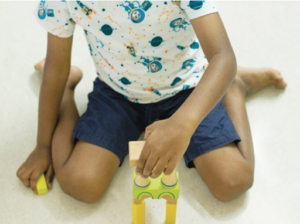
Making the call to Early Intervention (EI) can be the daunting first step in addressing developmental concerns for your child. What comes next? PlayWorks Therapy’s Director of Developmental Therapy, Kim Shlaes, explains what to expect during an Illinois Early Intervention initial evaluation.
Service Coordinator
After a referral is made for your child, a service coordinator is assigned to your case. The service coordinator:
- Is the point of contact for you and your family to help guide you through the EI process.
- Is responsible for conducting an intake meeting to collect all the needed information and paperwork to set up an initial evaluation.
- Coordinates the evaluation and ongoing services, should your child qualify.
- Is responsible for writing and updating the Individualized Family Service Plan (IFSP) based on recommendations made by providers during their initial evaluation, goals you and your family have for your child, and assessments while in EI.
- Is responsible for informing a family of their rights while in EI.
- Helps facilitate the transition from EI as the child ages out of the program at three years old.
Initial Evaluation
Next, your service coordinator organizes a team of at least two credentialed evaluators. The evaluation team is selected based on developmental concerns you have for your child. An evaluation team typically has a combination of the following: developmental therapist, occupational therapist, physical therapist, and/or speech and language pathologist. Other providers, such as social workers, nutritionists, interpreters, and others are added to an evaluation team as needed.
The initial evaluation typically takes about one hour to complete. A parent/guardian is required to attend the evaluation. A typical evaluation follows the following routine:
- Review reasons for the referral to EI, including parental and pediatrician concerns.
- Review the child’s birth and medical history. The evaluators will also ask questions about your child’s milestones, their social history (including who your child lives with, who cares for your child during the day, any languages your child is exposed to), and your child’s opportunities to socialize with other children.
- The evaluators take turns playing with your child.
- The evaluators ask you several questions about your child’s development (i.e. how your child completes “self-help” skills such as eating and dressing, how they socialize with other children, how they communicate with you, how they process sensory information, etc.).
- Evaluators then score their assessments and make recommendations for ongoing therapy or additional evaluations. If your child qualifies for services, you and the evaluators write discipline specific goals for your child, based on what your family wants to target while in EI. This part of the evaluation is the “IFSP meeting”.
What comes next?
Should you decide to move forward with Early Intervention services, your service coordinator organizes a team of credentialed therapists to provide service to your child. These therapists contact you directly to schedule your child’s therapy sessions, which are held in a natural environment for your child, most commonly your home or their school/daycare. Services typically begin within a few weeks of the initial evaluation.
Questions or concerns?
If you have questions or concerns about your child’s development or the Early Intervention process, please contact us at info@playworkschicago.com or 773-332-9439.
Kimberly Shlaes, MAT, DT
Director of Developmental Therapy Services
Photo Credit: willingness.com.mt/types-of-play-therapy/








